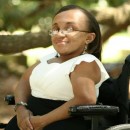- A
- A
- A

This month, I celebrated the one year anniversary of the hashtag #DisabilityTooWhite. This hashtag created space for discussions targeted racism, lack of visibility, representation, erasure, and exclusion of disabled people of color within our community.
Since the hashtag went viral, such complex conversations have taken place both on and off social media. Our community is the largest in the country and world, and incredibly diverse. We will do ourselves a great disservice and disadvantage if that diversity is not reflected in our leadership, grassroot efforts, and among self-advocates. Every disabled voice, story, and experience matters, and it is time that we give opportunities for everyone in our community to be represented and validated.
These conversations, as emotionally charging and at times triggering as they are, has to occur so that we can progress as a community and as a movement. We cannot discuss achieving freedom and independence if only a handful are able to reach these ideals. “Nothing about us without us” is our rallying cry, but we will fall short if all of us are not included in the work being enacted to protect and expand our rights domestically and abroad.
Changing the status quo will be a challenge; there are many who will resist viewing intersected perspectives as equal as their own. There is resistance in our community to broach topics that are outside of disability, and we have to move beyond that kind of thinking. Forbidding other identities and experiences to be voiced provides a limited understanding of the world those who are multiple-marginalized live in. How can we tackle the issues of education if we fail to see how disabled students of color are affected by the school-to-prison pipeline? If we are going to address the high unemployment rate of disabled people, we must also shed light on why disabled minorities have higher rates than their white counterparts. Though one topic may be the centered focus, the various impacts has to be broken down when inequalities exist for certain intersections of identity.
As I like to say, advocacy and social justice work are not for the faint of heart. There will be times when you may have to stand/roll firmly in the truths you know must be given. In order for these complex conversations to bear the fruit that we are looking to harvest, we may be called to stand/roll out and stand/roll out alone. Every day, I see advocates stand/roll unapologetically so that all of us can be seen and heard, and the work they do is not easy. As I reflect on the anniversary of the hashtag, I remember how hard it was to meet such dissent, knowing what was receiving pushback were the realities myself and others endured. However, I also fully understood that the realities being shared were not the issue – the culture that has been cultivated for so long that these statements spoke against was the problem. Keeping that in mind strengthened my ability to continue doing this work, and I hope that others who meet opposition in their advocacy work are reminded of this, too.
We cannot, and should not, run away from difficult conversations. The growing pains we experience because of them will reap benefits that can have lasting effects for years to come. Our community is changing, whether we like it or are ready for it. As the shift persists, we are faced with two dilemmas:
- Work with those who are leading the community to be more inclusive, intersectional, diverse, and acceptable; or
- Be left behind and stubbornly fight to uphold circumstances that only benefits ourselves.
The path one chooses is determined by our egos, and whether we will stand/roll up for what is in the best interest of the collective community or what best serves us as individuals. I have chosen my path – what will be yours?